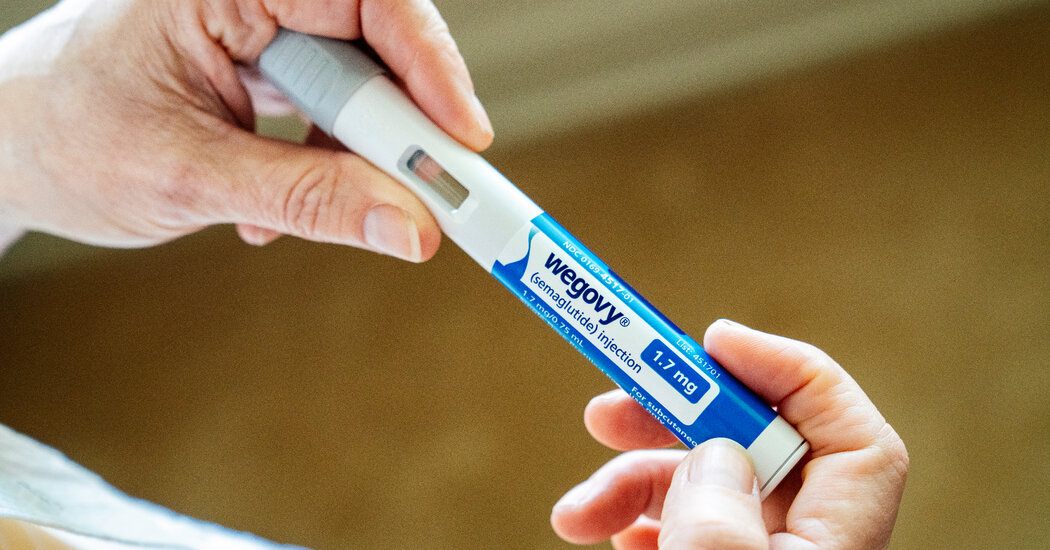President Trump on Thursday announced a deal that could significantly expand access for millions of Americans to hugely popular obesity drugs by reducing the price to as little as $150 a month.
The Trump administration’s agreements with the drugmakers Novo Nordisk and Eli Lilly would save consumers and the government considerable money on Wegovy, Zepbound and two obesity pills that are expected to win regulatory approval in the coming months.
The lowest price, of $150 a month, will be available only for the lowest doses of the pill form of the drugs. When those drugs reach the market, Medicare and Medicaid will pay that price, as will Americans using their own money to buy the pills directly from manufacturers.
The deal also broadens coverage of the injectable drugs for people on Medicare and Medicaid, the federal insurance programs for older people and those with lower incomes, and lowers the prices the government pays in those programs. Those measures are likely to expand access but still will stop far short of covering all of the millions of people with obesity under those federal programs.
The announcement comes amid a record-long government shutdown over disagreements in Congress over health care costs. Democrats have been withholding their votes on a government spending bill unless Republicans agree to extend subsidies that help Americans by Obamacare insurance.
Mr. Trump, who has long decried the high costs of prescription drugs, has announced a series of deals with drugmakers to lower their cash prices and commit to expanded manufacturing in the United States in exchange for exemptions from high tariffs. The deal on the diabetes and obesity medicines is likely to have the largest consumer impact, given the popularity of the drugs and the large number of Americans who already pay for them out-of-pocket.
Officials said that within the next few months, Americans would be able to use their own money to buy Novo Nordisk’s Wegovy and Eli Lilly’s Zepbound — which are both taken as injections — directly from manufacturers for an average of $350 a month, depending on the dose. The officials said they expected the average to fall to $245 over the next two years.
Starting around the middle of next year, Medicare and Medicaid coverage for the injectable drugs will be priced at $245 a month for beneficiaries who meet certain medical criteria, like having severe obesity or having obesity as well as kidney disease or heart failure. Eligible patients on Medicare will have a co-payment of no more than $50 a month. Patients on Medicaid have no or very small out-of-pocket costs.
The drugs have been shown to be powerfully effective in helping people lose weight and generating other benefits, like improvements in cardiac health. But they have been out of reach for many because they are so expensive. Many health insurance plans do not cover the obesity drugs.
Patients will be able to access the new prices on direct sales websites offered by manufacturers. The Trump administration plans to create TrumpRx.gov, which will direct patients to manufacturer websites like the ones offered by Novo Nordisk and Eli Lilly. Officials put up a promotional version of the TrumpRx website last month and plan for it to be operational next year.
Novo Nordisk offers all of its Wegovy doses at $499 a month for patients who use their own money. Eli Lilly has been offering its lowest dose for $349 and the others at $499.
Available for the last several months, those prices have proved popular. Eli Lilly said last week that nearly 40 percent of new prescriptions for Zepbound are now filled by patients buying the drugs with their own money.
Novo Nordisk has applied to the Food and Drug Administration to seek approval for a high-dose version of Wegovy taken as a pill, with that decision expected by the end of the year.
This year, Eli Lilly also announced clinical trial results showing that orforglipron, an experimental drug taken as a daily pill, helped people with diabetes and obesity lower their blood sugar and lose weight. The company said that by the end of the year, it planned to apply to the F.D.A. for marketing approval of the medication.
A small share of Medicare beneficiaries already have coverage for Wegovy or Zepbound because they have obesity in addition to a medical condition, like heart problems or sleep apnea, that the drugs have been shown to help alleviate.
Currently, Medicare drug plans are allowed to cover the drugs for these people, estimated in the millions, but they are not required to do so.
But the legislation that created Medicare’s drug benefit explicitly prevents the program from covering drugs for “weight loss,” effectively barring their use for most beneficiaries.
The Biden administration tried to expand coverage of the drugs to patients who didn’t have those additional diagnoses by arguing that it would allow them for the treatment of the disease of obesity, an approach the Trump administration rejected earlier this year.
Under the Biden proposal, an estimated 3.4 million more beneficiaries would have gained coverage for the medicines.
Medicaid programs are generally required to cover all drugs that are approved by the F.D.A. But they too have a legal carve-out for weight-loss drugs. Rather than a complete ban, federal law allows states to decide whether to cover obesity medicines.
Only a handful of state Medicaid programs have begun covering these drugs, and a few have already withdrawn coverage this year in the face of budgetary pressures. Lower prices may induce more states to consider covering the drugs.
The specific prices that American employers and government programs pay for obesity drugs are not publicly disclosed. A typical price for large employers to cover their workers’ prescriptions is somewhere from $550 to $650 a month, according to the Health Transformation Alliance, a group of large employers.
The companies also announced that they would expand manufacturing capacity in the United States.
Compounding pharmacies, which produce versions of brand-name medicines, have built a robust business in the last few years by underpricing Novo Nordisk and Eli Lilly.
In the spring, the F.D.A. ordered sales of the compounded versions to stop, because the brand-name drugs were no longer in shortage. But the sales have persisted, as compounders have used formulas like mixing in vitamins or tweaking dosing levels to avoid the ban that experts said fell into a gray area.
Mr. Trump likes to talk about how the obesity drugs are much cheaper in London than in New York. He is right, but the details are complicated.
Some American patients who have insurance coverage for the obesity drugs face low out-of-pocket costs of, say, $25 a month.
Nearly all European countries refuse to cover the obesity drugs through their national health systems. European patients must generally use their own money to buy the drugs at pharmacies.
Britain strictly limits who can get the obesity drugs covered through the national health system, reserving coverage for the heaviest people with weight-related health conditions. The prices Britain pays are still lower than the new direct-buy prices Trump officials negotiated in the United States. In Britain, the list prices for the lowest doses are the equivalent of about $100 per month for Wegovy and about $170 per month for Zepbound.
Reed Abelson and Gina Kolata contributed reporting.
Rebecca Robbins is a Times reporter covering the pharmaceutical industry. She has been reporting on health and medicine since 2015.
Margot Sanger-Katz is a reporter covering health care policy and public health for the Upshot section of The Times.
Dani Blum is a health reporter for The Times.
The post Obesity Drugs May Drop to as Little as $150 a Month appeared first on New York Times.




